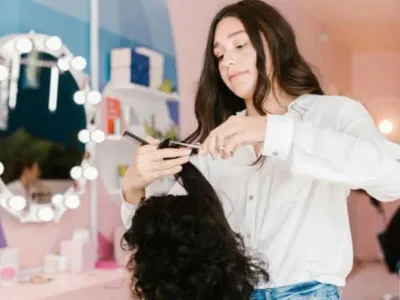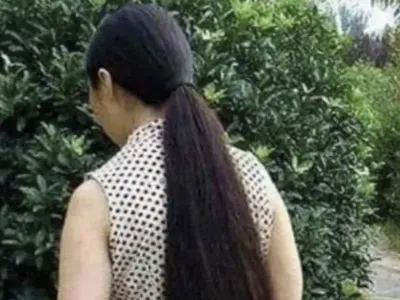MY HUSBAND CRITICIZES MY NEW HAIRCUT, SAYS I LOOK “LIKE A MAN.”
I recently decided to make a big change in my life—a change that felt both thrilling and necessary. For a while, I had been carrying around the weight of negativity, both from external sources and my own inner struggles. I felt trapped in a routine, not just in life but in how I presented myself to the world. My long hair, which I had always taken pride in, began to feel like a symbol of that heaviness. So, after much contemplation, I decided it was time to do something bold and liberating. I booked an appointment at the salon and, with a mix of excitement and nervousness, told the stylist to give me a pixie cut.
As I sat in the chair, watching long locks of hair fall to the ground, I felt a surge of empowerment. It was as if each snip of the scissors was cutting away not just hair, but also old, stale energy that had been holding me back. The transformation was more than physical; it was emotional and psychological. When the stylist turned the chair around and I saw my new reflection, I was surprised by how much I loved it. The pixie cut was chic, fresh, and, most importantly, it felt like the real me. I left the salon with a spring in my step, feeling lighter, freer, and more confident than I had in years.
However, when I walked through the door at home, eager to show off my new look, my excitement was quickly dampened. My husband, who had always been supportive of my decisions, took one look at me and his face fell. I had expected some surprise—after all, it was a drastic change—but I wasn’t prepared for his reaction. He didn’t just express mild disapproval; his words were sharp and hurtful. “You look awful,” he said bluntly. “Like a man.”
His next words stung even more: “Maybe you should wear a wig until your hair grows back.” I stood there, stunned, as the joy I had felt just moments before drained away. It wasn’t just that he didn’t like the haircut; it was the harshness of his critique and the implication that my appearance was now unacceptable, even to the point of needing to cover it up.
That night, I found myself alone in the bathroom, staring at my reflection. The woman I saw in the mirror was still the same one who had left the salon feeling empowered, but now doubt had crept in. Was my haircut really that bad? Had I made a mistake? I started to second-guess the decision that had felt so right just hours earlier.
My husband’s words kept echoing in my mind, making me question my judgment, my self-worth, and my ability to make decisions about my own body. I wondered if I had been too impulsive, if maybe I hadn’t thought it through enough. But then, I remembered why I had done it in the first place—to shed old baggage, to feel stronger, and to express my true self.
The more I thought about it, the more I realized that this change was about me, not about anyone else’s opinion, not even my husband’s. While it hurt that he couldn’t see the beauty and strength I felt in my new look, I knew deep down that my feelings about myself were what mattered most. I had taken a step to reclaim my sense of self, to break free from the expectations and norms that had kept me in a box for too long.
Yes, my husband’s reaction had shaken me, but it also highlighted an important truth: Sometimes, the people closest to us may not understand or appreciate the changes we make, especially when those changes challenge their perceptions. It’s in these moments that we must stand firm in our choices and remember why we made them.
In the days that followed, I started to reclaim my confidence. I received compliments from friends, coworkers, and even strangers who admired my bold new style. Each positive comment helped to rebuild the confidence that my husband’s words had torn down. And slowly, I began to realize that his reaction was more about his own insecurities and expectations than about how I actually looked.
The pixie cut, it turns out, wasn’t just a haircut. It was a statement—a declaration of my independence, my courage, and my willingness to embrace change. While my husband may not have understood it at first, I came to see that this change was something I needed, something that was helping me grow into the person I wanted to be.
So, no, my haircut isn’t “awful.” It’s a powerful reminder that I am in control of my own narrative, and I’m proud of the woman I see in the mirror.



